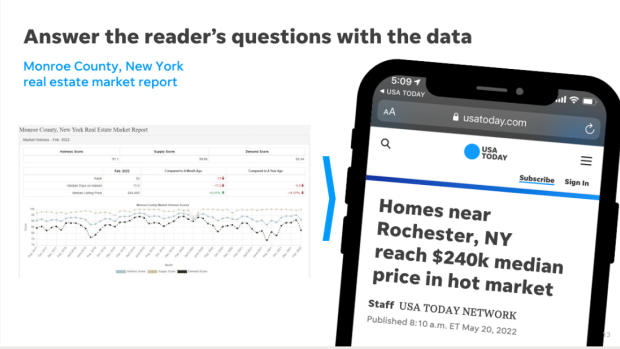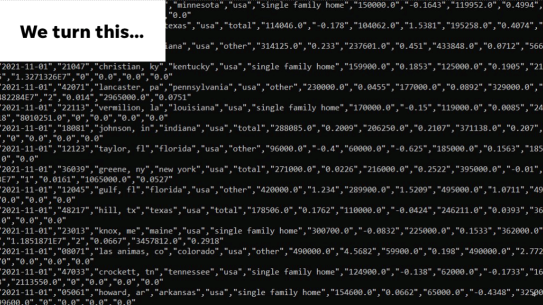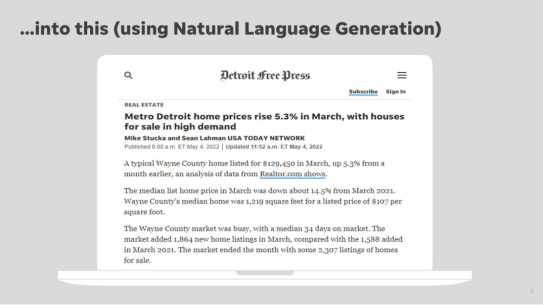AI & Local News Challenge, Gannett/USA TODAY Network’s Localizer news automation program

RESEARCH & INNOVATION | CENTERS | NYC MEDIA LAB | PROJECTS | AI & LOCAL NEWS
News Automation at Gannett has grown significantly over the past two years. A key factor of the Localizer project has been our strategy to use Natural Language Generation tools to deliver targeted content to readers and grow subscriptions. Our participation in the NYC Media Lab’s AI & Local News Challenge offered a chance for us to deepen our efforts around automating real estate trend reporting.
The Localizer program uses Natural Language Generation techniques to inform readers and reduce newsroom toil by creating uniquely localized content only possible through automation, for our 230+ newsrooms across the USA TODAY Network. More than that, it’s an engine for delivering repeatable and sustainable journalism by telling stories like we couldn’t before.
National publications share the bigger trends on topics like the real estate market, but can’t always represent what’s happening in local communities. With Localizer, we’re able to zoom in on hyperlocal trends, highlighting specific local data, creating specific stories for local markets. Who among us hasn’t looked up the value of our home on Zillow or Redfin? But those sites don’t show trends for the wider community beyond that one home.
These headlines are useful to understanding what’s happening locally.
By using Natural Language Generation techniques, we’re able to create highly relevant local content that spurs digital subscription growth in Gannett’s local markets. Increasingly, this content is more likely to appear on a user’s path to subscription.
How do we create a Localizer story? We start off with structured data, the kind of stuff you’d maybe see in an Excel spreadsheet. We transform that data and turn the text and numbers into stories, much like the Mad Libs you may have done as a kid.
Here’s an example of one of our listings stories that ran on the Detroit Free Press.


In an old model, a story might take one reporter two hours to report. If we were to repeat that across our network, that gets expensive quickly. In the new model, a single reporter is able to create or update an NLG template in half the time and publish a localized story to 230+ newsrooms.
Automated text generation is important to Gannett because it allows us to provide valuable stories that are more likely to convert subscribers at scale, with a consistency that some of our newsrooms could not achieve on their own.
We want to be clear that we don't use NLG to replace journalists. The story templates are written by reporters, informed by their expertise and reporting, and then shared across all our newsrooms. Our content is used to fill gaps in coverage on topics relevant to potential and current subscribers. Our NLG tools also free up other reporters to do higher-level work that can't be automated.
We’ve found topics that are localized and of high interest to readers that we can generate from data sources and save everyone time. Here’s a short list of the impactful stories we have created (many have been recurring monthly and even weekly):
- Hurricane trackers
- Monthly unemployment trends
- COVID-19 case and vaccine trackers
- Real estate sales and listing trends
- Personal income by county
By combining our reporting and data analysis capabilities with Natural Language Generation tools, we are creating valuable local journalism that moves the needle for our digital subscriptions business at a scale that would not otherwise be cost effective. We are currently going deep into automating real estate content, which is performing well with search, social and internal audiences.
During the NYC Media Lab AI & Local News Challenge, we were able to publish an additional real estate listings story. Initial data shows 3x stronger subscriber engagement with real estate stories compared with past Localizer stories. We’re excited to go even further by exploring additional stories, new data sets and imagery solutions in the future.
Our stories find an audience on search because we factor SEO optimization into the templates even if a human doesn’t promote them after publication. We then take those reader questions and answer them in the data.
There are different degrees of News Automation, ranging from assistive to fully automatic. At Gannett, our Localizer stories receive an editor review before publishing. This is important to us to ensure quality and that we uphold our journalistic standards.
We’re not using automated story generation to create most of the content. We’re careful to answer audience questions and meet their needs. We analyze and tweak the stories after each project cycle to ensure continued relevance for ongoing projects.
We are prioritizing consistency and volume. We are exploring going deeper into real estate automation as the immediate next step to quickly gain momentum on story volume.
We have a core talented team from product and editorial that makes this all happen. We have journalists committed to building a sustainable future for local journalism.
Relevance at scale = value for audiences = sustainability for our newsrooms.
This is a sustainable project because we tap into our network of data journalists, developers, editors, producers, project managers, audience strategists and, product managers, as well as leverage external partnerships. We started the project with an ad hoc cross-discipline group of volunteers (adding this to their regular workload) until we proved success. We now have some people assigned full-time
Localizer delivers a steady diet of highly relevant local information.). As we look to meet local communities' information needs at a cost that our business model can support, Localizer is a powerful tool in the arsenal.
If you’d like to be in touch about partnering with us, please reach out to Jessica Davis (jedavis@gannett.com) or Steve Dorsey (sdorsey@gannett.com).
Team
The News Automation Team has been at the forefront of pilot concepts through our Localizer Project, producing hyperlocal articles for COVID-19 case and vaccination trackers, hurricane coverage, a U.S. Census data release and real estate trends in the past year. The team is a mix of experienced journalists and product partners with backgrounds including data reporting, software development, product management, audience development and content strategy. The current cross-divisional effort is comprised of and draws on experience from previous automation efforts at GateHouse Media and Gannett prior to the companies’ merger.




